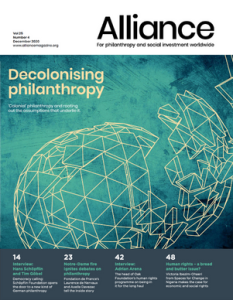When entrepreneur Yvonne Field, founder of the Ubele Initiative, told me where her grounding as an activist came from, two things stood out. First, she learned from her elders, like campaigner Mavis Best, and she was involved in the Anti-Apartheid Movement. Through this, Yvonne discovered, among many things, the importance of communities taking the lead, sacrifice, laughter and joy, and belief.
Imagine if institutional philanthropy (charitable trusts, corporate foundations, etc.) adopted similar principles. Imagine if it was accountable to communities and genuinely willing to sacrifice. Imagine if it understood the joy that leaps through the cracks of oppression or had enough faith in communities to determine their destinies and win.
For many activists and social entrepreneurs – those reimagining education, healthcare, knowledge, childcare, housing, economics, and tax systems – transformative change does not exist within the ‘boxes’ that the institution uses to judge.

Photo credit: Shutterstock
While activists and writers have called for changes in philanthropy for many years, broadly speaking, a shift from charity to social justice, the last three years have highlighted how the institution reinforces the disparities we see in our society.
We know some truly exceptional individuals, collectives, and organisations –systemic, intersectional, community-driven, imaginative, etc. – are under-resourced. We know racially and other minority-led groups have been severely underfunded historically. Institutional philanthropy lacks diversity. Social movements, campaigning, and community organising barely receive any funding. Endowments continue to grow, as they have done through austerity and, I believe, Covid and the cost-of-living crisis. We know there is enough philanthropic capital to sustainably support the exceptional and underfunded. It is unethical for charitable trusts and foundations to continue to give away less than 5 per cent of their wealth.
Institutional philanthropy is a model of capitalism, not giving – a model of preservation, not transformation. And it is the minoritised, particularly people of colour, who are paying the price. This is true of global communities, the social enterprises and movements that support them, and the many charity workers silenced within mainstream institutions.
If you ask me what the function of institutional philanthropy should be, particularly charitable trusts and foundations, it would be to redistribute all its wealth through a reparative lens to the communities most harmed by our extractive economy. That’s the case I make in my book, Giving Back. But in addition, philanthropy should be a tool that rebalances power, supports communities to grow theirs, and moves away from an institutional practice to a cultural one, where risk and reward are shared.
I would love it if funders interrogated their wealth and power, were willing to challenge their truths, and could genuinely ‘imagine a new world.’ But unfortunately, we are a long way from that. We need a starting point towards some fairness and accountability, though.
This month, Bond, the UK network of NGOs, is hosting the Power in Development conference to try and tackle some of these issues. I will be speaking there about how to build an equitable system – showing donors, INGOs, and government how they can devolve power and decolonise development systems. This is crucial because we need to move away from just taking notes at conferences to taking real, urgent action.
Institutional philanthropy should be fair and accountable in its grantmaking, offering long-term (20 years), unrestricted grants to historically underfunded groups, particularly those led by racially and other minoritised people. In addition, they should be funding more unregistered groups, individuals, and movements.
Beyond that, funders can move money in ways their grant-making and investments work in greater harmony:
- If they don’t know how to shift funding to particular groups, they can release some of their endowments to provide long-term support to new entities that can. These collectives include Project Tallawah, Baobab Foundation, and the Black Feminist Fund.
- They could start to reimagine wealth altogether by shifting the purpose of capital from accumulation to redistribution back to communities to build their assets or resourcing new economic systems. If they don’t want to spend down, how about using that excess wealth they’re accumulating to give differently? Thirty Percy and Good Ancestors Movement are leading strategic thinkers in the investment space.
- What would it look like for a foundation to release 1-2 per cent more of its endowment yearly for 20 years?
Institutional philanthropy appears unwilling to genuinely look in the mirror and fundamentally change, even during a time when the widening economic disparities, climate crisis, and racial injustice are so stark—a shame. When future generations judge what the institution did during these times, they will not view it favourably. When you have wealth, power, and independence, doing good is not enough. Particularly when there’s no equity between giving and growth.
Derek A Bardowell is the author of Giving Back: How To Do Good, Better (Dialogue Books/Little, Brown) and CEO of Ten Years’ Time. He will be speaking at Bond’s Power in Development Conference, which takes place on 12 and 13 September 2022.
New issue: Decolonising philanthropy
 The word ‘decolonisation’ was coined to describe the withdrawal of colonial powers from territories they had occupied. What forms have decolonisation practices taken among foundations? Should philanthropy be making reparations? And what significance does decolonisation have for philanthropic institutions when they are geographically distant from the former colonies? These are among the questions to be explored in the latest issue of Alliance. Guest edited by Shonali Banerjee, Centre for Strategic Philanthropy, Cambridge University and Urvi Shriram, Indian School of Development Management.
The word ‘decolonisation’ was coined to describe the withdrawal of colonial powers from territories they had occupied. What forms have decolonisation practices taken among foundations? Should philanthropy be making reparations? And what significance does decolonisation have for philanthropic institutions when they are geographically distant from the former colonies? These are among the questions to be explored in the latest issue of Alliance. Guest edited by Shonali Banerjee, Centre for Strategic Philanthropy, Cambridge University and Urvi Shriram, Indian School of Development Management.
Subscribe today to read it!






Comments (0)